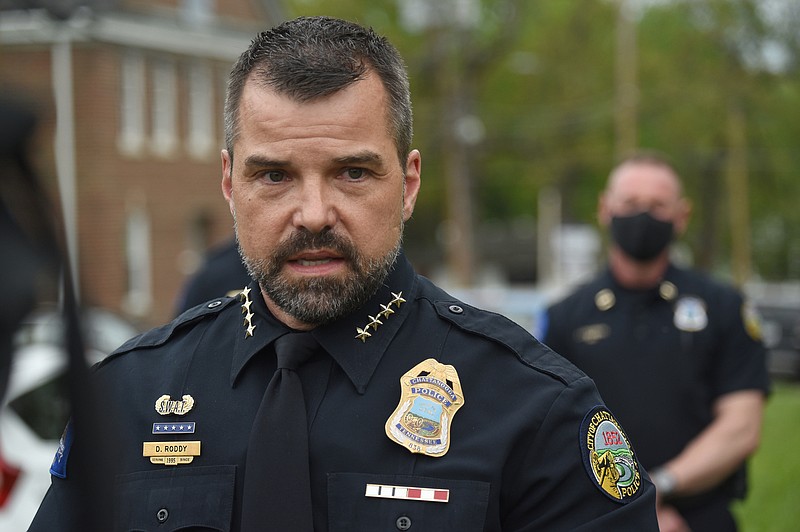A little known provision of a 1990 Voting Rights Act federal court order that forced Chattanooga to change its form of government more than three decades ago is preventing the city from maintaining a fully staffed police force.
The order, which directed the city to create a more diverse form of government, contains wording that restricts city police hiring from outside Tennessee.
Chattanooga Police Chief David Roddy believes that provision ought to be changed, and we agree.
Roddy said the department is losing an astounding five to six officers a month for reasons other than retirement. He wants the latitude to recruit in North Georgia, just across the border from Chattanooga, and in North Alabama.
"It's a difficult time to be a police officer," he told Chattanooga City Council members Tuesday. "Many who are leaving us are getting out of law enforcement altogether."
We don't wonder why.
The culture created in recent years that blames all police when a few display conduct unbecoming to law enforcement, a culture which has been inflamed by Democratic politicians and the national media, has given those in the profession great pause about whether they are in the right field.
Roddy didn't say that, but he didn't need to.
Officers leave the profession for other reasons, of course. It's dangerous, and if officers have a spouse and children they may decide it's not worth the risk.
Pay is also a factor. As the economy improves and the coronavirus fades, better paying jobs will be more readily available.
That's why Roddy wants to widen the department's field of recruitment.
"I can recruit somebody who lives in Memphis," he told council members, "but not someone from Catoosa County."
When Roddy appeared before the city council earlier this week, the only member who didn't seem to grasp the situation was Russell Gilbert, who was attending his last meeting after giving up his seat to make an unsuccessful run for mayor.
The District 5 representative opined that there were "very few African Americans living in North Georgia and North Alabama" and that widening the recruiting field "could lead to less opportunities for African Americans here."
Roddy in recent years - and previous police chiefs before him for at least 30 years - have been trying to widen minority hiring on the force. Only weeks go, Roddy was able to announce that the racial demographics of the first 2021 cadet academy nearly mirror the city's population.
The 24-member class was 54% white, 34% Black and 8% Hispanic/Latino, while 2019 Chattanooga census data shows the city's population as 62% white, 31% Black and 6% Hispanic/Latino.
The entire force hasn't reached such a racial breakdown yet but is improving.
"The Chattanooga Police Department as a whole has worked diligently for years now to become more diverse," Roddy said when revealing the cadet class, "and I couldn't be more proud of the efforts. We are starting to see the result we've been striving for and that our community members have asked for."
So the police chief isn't planning to trawl North Georgia and North Alabama to make the department force whiter. He'd like to recruit there to get qualified, trainable applicants of any race to fill positions it is losing.
And the areas have more minorities than Gilbert might have imagined. According to 2019 census estimates, Walker and Whitfield counties in Georgia have populations that are 4.4% Black, and Jackson County in Alabama has a 3.5% Black population. Meanwhile, Whitfield County has a population that is 36.3% Hispanic/Latino, and that figure in DeKalb County, Alabama, is 15.1%.
After Roddy's presentation, the city council voted 7-1 (with Gilbert casting the only "no" vote) to allow the city attorney to seek to have the Brown vs. City of Chattanooga order altered in federal court.
State Sen. Todd Gardenhire, R-Chattanooga, said the city attorney meeting with a federal court judge and having the specific provision in the 1990 order struck - based on the council's vote - will be much quicker than a referendum that would have to come before voters and take several years. The provision was put in the order, he said he learned, because of payroll issues that were likely to arise from officers who live out of state.
On the other side of the coin, he said, is the belief that first responders should live in the city where they work and receive pay, insurance and benefits. In turn, he said, they should use their influence there.
As much as we'd like to have officers live in the city where they work, we feel keeping a full - and diverse force - is more important. Paying them a higher salary, where possible, also will prevent more officers from leaving. In the meantime, we hope striking the provision from the 1990 order will give the department broader hiring options.
